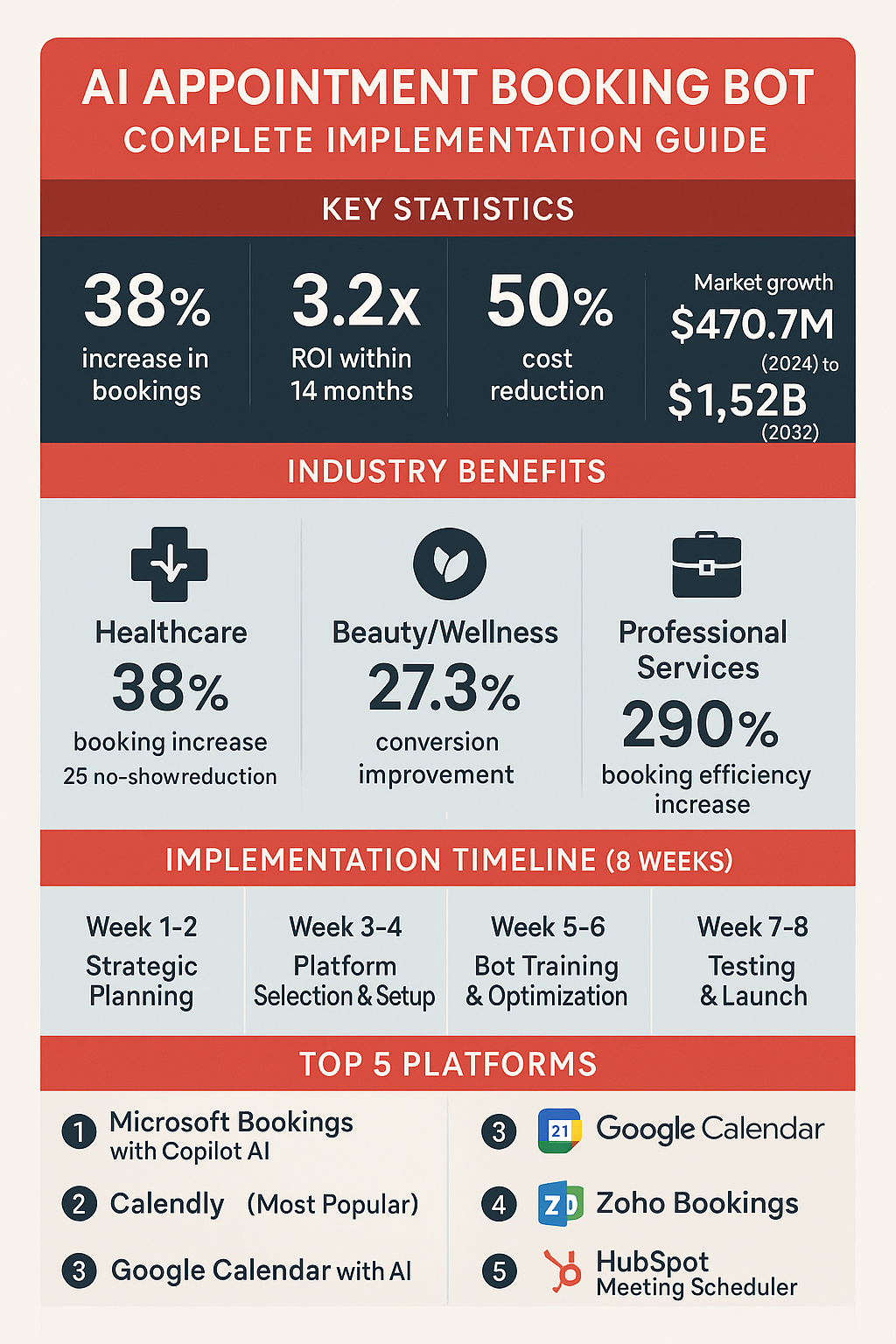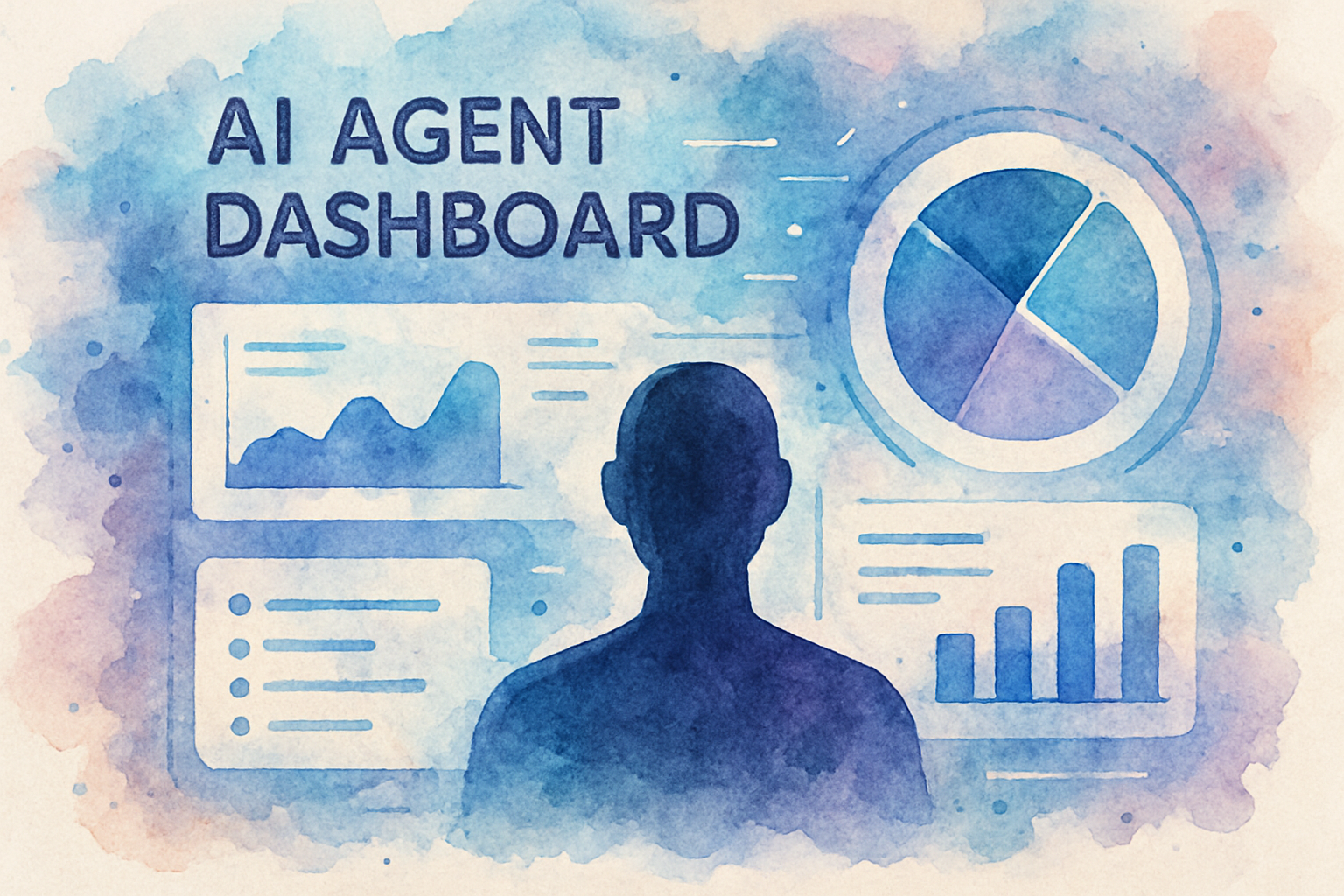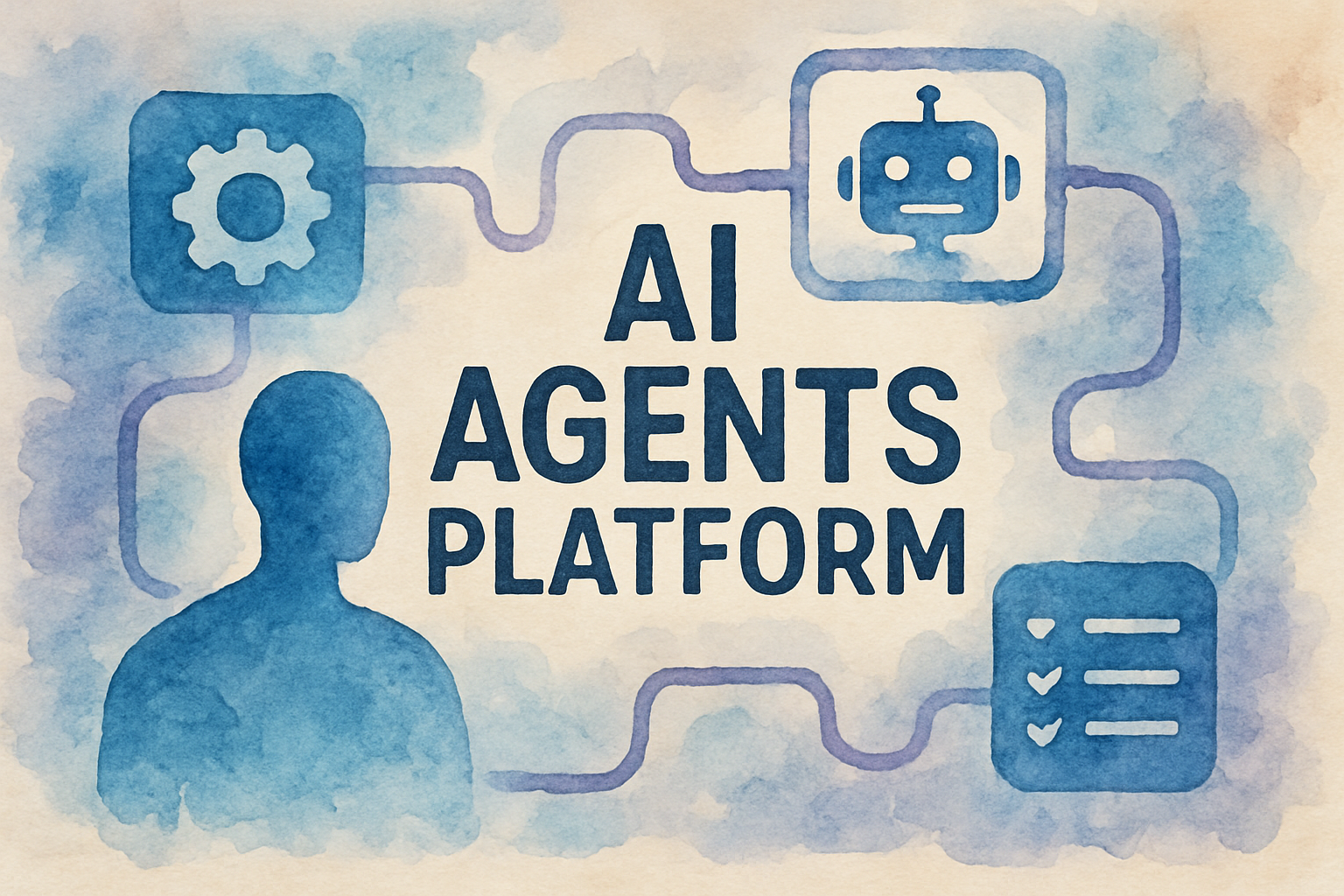AI Appointment Booking Bot Increases Bookings by 38%: Your Complete Implementation Guide
The appointment booking landscape has been revolutionised by AI technology, with businesses reporting 38% increases in successful bookings and 3.2x return on investment within 14 months, according to recent industry research. This comprehensive guide provides everything you need to understand, evaluate, and implement an AI appointment booking bot that transforms your scheduling operations while reducing costs by up to 50%.
The Compelling Business Case: Statistics That Drive Action
Market Growth Demonstrates Proven Value
The AI appointment booking market isn’t just growing—it’s exploding with validated business results. The global appointment scheduling software market reached $470.7 million in 2024 and is projected to hit $1.52 billion by 2032, representing a 15.7% compound annual growth rate, according to Fortune Business Insights.
More significantly, businesses implementing AI appointment booking bots report remarkable performance improvements:
Conversion Rate Improvements:
- Healthcare practices: 38% increase in booking conversions
- Beauty salons: 27.3% conversion improvement
- Professional services: 290% booking efficiency increase
- Automotive services: 56% average conversion rate (leading performers achieve 70%)
Operational Cost Reductions:
- Administrative costs: 30-50% reduction
- No-show rates: 25-35% decrease
- After-hours booking capture: 67% improvement
- Staff scheduling conflicts: 40% reduction
Consumer Acceptance Reaches Tipping Point
The most significant barrier to AI booking implementation—customer acceptance—has been decisively overcome. Recent research from Salesforce’s State of Service report reveals:
- 39% of consumers are comfortable with AI agents scheduling appointments
- 60% will interact with AI if it provides timely, accurate responses
- 34% prefer AI agents to avoid repeating themselves
- 88% of healthcare appointments are still scheduled by phone, representing a massive AI opportunity
Understanding AI Appointment Booking Bot Technology
Core Capabilities That Drive Results
Modern AI appointment booking bots combine several sophisticated technologies to deliver human-like interactions:
Natural Language Processing (NLP):
- Understands context across multi-turn conversations
- Handles complex references like “next Tuesday” or “my usual time”
- Supports 140+ languages with automatic detection
- Maintains conversation context throughout the booking process
Machine Learning Algorithms:
- Predicts optimal appointment times based on historical data
- Identifies no-show risk factors and applies preventive measures
- Learns from booking patterns to improve recommendations
- Adapts responses based on customer behaviour analysis
Real-Time Integration:
- Bi-directional calendar synchronisation across multiple platforms
- Live availability checking prevents double bookings
- Instant payment processing and confirmation
- Seamless handoff to human staff when needed
Predictive Analytics:
- Demand forecasting for optimal staff scheduling
- Customer preference learning from minimal interaction data
- No-show probability assessment for targeted interventions
- Revenue optimisation through intelligent slot allocation
Step-by-Step Implementation Guide
Phase 1: Strategic Planning (Week 1-2)
Business Requirements Assessment:
- Define your booking volume and complexity:
- Current monthly appointment volume
- Peak booking periods and seasonal patterns
- Average appointment types and duration
- Staff scheduling constraints and availability
- Identify integration needs:
- Existing calendar systems (Google, Outlook, proprietary)
- Customer relationship management (CRM) platform
- Payment processing requirements
- Communication channels (website, WhatsApp, SMS)
- Establish success metrics:
- Booking conversion rate improvement targets
- Cost reduction goals
- Customer satisfaction benchmarks
- Staff efficiency metrics
Budget Planning:
- Basic implementation: $2,500-6,250
- Advanced features: $6,250-18,750
- Enterprise deployment: $18,750-62,500
- Monthly operational costs: $62-625
Phase 2: Platform Selection and Setup (Week 3-4)
Recommended Platform Matrix:
| Business Type | Best Platform | Monthly Cost | Key Features |
|---|---|---|---|
| Small Healthcare | Acuity Scheduling | $16-50 | HIPAA-compliant, intake forms |
| Beauty/Wellness | Booksy | $31-52 | Industry specialisation, marketplace |
| Professional Services | Calendly | $10-16 | B2B focus, team scheduling |
| Multi-location | SimplyBook.me | $9-52 | 70+ features, location management |
| Startups | Setmore | Free-$10 | Robust free plan, social integration |
Technical Setup Process:
- Account Configuration:
- Generate API keys for calendar integration
- Configure security settings and user permissions
- Set up payment processing (Stripe recommended)
- Establish backup and recovery procedures
- Calendar Integration:
- Connect Google Calendar, Outlook, or Exchange
- Configure bi-directional synchronisation
- Set availability rules and buffer times
- Test integration with multiple booking scenarios
- AI Bot Development:
- Define conversation flows for different appointment types
- Create a knowledge base with business information
- Configure fallback procedures for complex requests
- Establish escalation protocols for human staff
Phase 3: Bot Training and Optimisation (Week 5-6)
Conversation Flow Design:
Initial Greeting:
Bot: "Hello! I'm here to help you book an appointment.
What type of service are you looking for today?"
Options: [Consultation] [Treatment] [Follow-up] [Speak to Human]
Service Selection:
Bot: "Great! I can help you book a consultation.
Which location would you prefer?"
[Location A] [Location B] [Any location is fine]
Availability Checking:
Bot: "I have several times available this week.
Would you prefer morning or afternoon appointments?"
[Morning (9am-12pm)] [Afternoon (1pm-5pm)] [Evening (6pm-8pm)]
Booking Confirmation:
Bot: "Perfect! I've booked your consultation for Tuesday,
March 15th at 2:00 PM with Dr. Smith at our Central location.
You'll receive a confirmation email shortly."
Knowledge Base Essential Elements:
- Business hours and location information
- Service descriptions and pricing
- Staff availability and specialisations
- Cancellation and rescheduling policies
- Payment options and insurance acceptance
- Frequently asked questions and responses
Phase 4: Testing and Launch (Week 7-8)
Alpha Testing Protocol:
- Test all booking scenarios with internal staff
- Verify calendar integration accuracy
- Confirm payment processing workflows
- Check escalation procedures to human agents
- Validate data security and compliance measures
Beta Testing with Customers:
- Select 20-50 existing customers for the beta program
- Provide multiple feedback channels
- Monitor conversation logs for improvement opportunities
- Track conversion rates and user satisfaction
- Identify and resolve technical issues
Launch Strategy:
- Gradual rollout starting with 25% of traffic
- Monitor performance metrics daily
- Maintain human backup during initial weeks
- Collect customer feedback continuously
- Optimise conversation flows based on real usage
Industry-Specific Implementation Strategies
Healthcare: Compliance-First Approach
HIPAA Compliance Requirements:
- Business Associate Agreements (BAAs) with all AI vendors
- Encrypted data transmission and storage
- Audit logs for all patient interactions
- Minimum necessary access controls
- 24-hour breach notification procedures (new 2025 HIPAA requirements)
Implementation Priorities:
- Patient intake automation: Streamline pre-appointment forms
- Insurance verification: Integrate with insurance databases
- Appointment reminders: Reduce no-show rates through intelligent sequencing
- Telemedicine booking: Support virtual and in-person appointments
- Emergency triage: Route urgent requests appropriately
Expected Results:
- 47% increase in digital appointment bookings (Weill Cornell Medicine case study)
- 67% conversion rate in the first week (Russell’s Ophthalmology implementation)
- 20% reduction in no-show rates through AI-powered reminders (Healthcare AI Research)
Beauty and Wellness: Experience-Focused Implementation
Key Features for Beauty Industry:
- Visual service selection with treatment descriptions
- Stylist-specific booking capabilities
- Package and membership management
- Loyalty program integration
- Social media appointment booking
Implementation Strategy:
- Service customisation: Configure treatments, durations, and pricing
- Staff scheduling: Match services with qualified providers
- Client preferences: Track favourite stylists and treatments
- Inventory management: Connect with product tracking systems
- Gift card integration: Enable gift certificate bookings
Proven Results:
- 27.3% conversion improvement (Salon Tonight case study)
- 5,000+ appointments processed at a single location (Julep Parlors)
- $10,625+ gift card sales through online portal
Professional Services: Efficiency-Driven Deployment
Optimisations for Professional Services:
- Multi-participant meeting coordination
- Document sharing and preparation reminders
- Time zone handling for global clients
- Recurring appointment patterns
- Consultation type differentiation
Implementation Focus:
- Client qualification: Screen prospects before booking
- Resource coordination: Manage conference rooms and equipment
- Preparation automation: Send relevant materials before meetings
- Follow-up scheduling: Automate next appointment booking
- Billing integration: Connect with time tracking systems
Business Impact:
- 290% booking efficiency increase (LegalClerk AI implementation)
- 15-30% increase in booked appointments across the sector
- 25-35% reduction in no-shows
Advanced Features and Optimisation Strategies
Predictive Analytics Implementation
No-Show Prevention System:
- Risk scoring algorithm: Analyse booking patterns, history, weather, and timing
- Targeted interventions: Customised reminder sequences for high-risk appointments
- Waitlist management: Automatically fill cancelled slots
- Deposit requirements: Request payment for high-risk bookings
Demand Forecasting:
- Historical pattern analysis for staff scheduling
- Seasonal demand prediction for resource allocation
- Peak time identification for pricing optimisation
- Capacity planning for business growth
Multi-Channel Integration Strategy
Communication Channels:
- Website chat widget: Primary booking interface
- WhatsApp Business: Mobile-first booking experience
- SMS integration: Text-based scheduling for convenience
- Voice calls: Phone-based AI for traditional customers
- Social media: Direct booking through Facebook and Instagram
Channel-Specific Optimisation:
- Mobile-optimised conversations for WhatsApp and SMS
- Voice-activated booking for accessibility
- Social media integration with visual service selection
- Email follow-up for booking confirmations and reminders
Performance Monitoring and Analytics
Key Performance Indicators (KPIs):
| Metric | Industry Benchmark | Target Improvement |
|---|---|---|
| Booking conversion rate | 15-25% | +38% with AI |
| No-show rate | 15-20% | -35% reduction |
| Average booking time | 8-12 minutes | 2-3 minutes |
| Customer satisfaction | 3.5-4.0/5 | 4.3-4.8/5 |
| After-hours bookings | 10-15% | 35-45% |
Analytics Dashboard Setup:
- Conversion funnel analysis: Track where customers drop off
- Peak booking times: Optimise staff scheduling
- Service popularity: Adjust availability and pricing
- Customer satisfaction scores: Monitor experience quality
- Revenue per booking: Track financial impact
Overcoming Common Implementation Challenges
Technical Integration Difficulties
Legacy System Compatibility:
- API middleware solutions: Bridge incompatible systems
- Gradual migration strategy: Phase out old systems progressively
- Cloud-based integration: Reduce on-premise complexity
- Professional implementation: Invest in an expert setup
Data Synchronisation Issues:
- Real-time webhooks: Immediate updates across systems
- Conflict resolution protocols: Handle booking overlaps
- Backup synchronisation: Prevent data loss
- Testing procedures: Validate integration before launch
Customer Adoption Resistance
Building Trust and Acceptance:
- Transparent AI communication: Clearly identify AI interactions
- Easy human escalation: Provide quick access to human agents
- Natural conversation design: Avoid robotic responses
- Success story sharing: Demonstrate value to customers
- Gradual rollout: Introduce AI alongside human options
Training Your Team:
- AI system capabilities: Understanding limitations and strengths
- Escalation procedures: Knowing when to intervene
- Performance monitoring: Tracking success metrics
- Customer support: Handling AI-related questions
- Continuous improvement: Implementing optimisations
Regulatory Compliance and Security
Healthcare-Specific Requirements:
- HIPAA Security Rule updates (2025): Enhanced cybersecurity standards
- Risk assessment documentation: Comprehensive security evaluations
- Incident response planning: 24-hour breach notification procedures
- Access control management: Minimum necessary data access
- Audit trail maintenance: Complete interaction logging
GDPR Compliance for European Customers:
- Consent management: Clear data collection disclosure
- Data subject rights: Access, correction, and deletion procedures
- Privacy policy updates: Accessible and understandable terms
- Data minimisation: Collect only necessary information
- Retention policies: Secure data deletion procedures
Cost-Benefit Analysis and ROI Projections
Investment Breakdown by Business Size
Small Practice (1-5 providers, 10,000 annual appointments):
- Initial investment: $2,500-5,000
- Monthly costs: $50-150
- Annual savings: $6,250-15,000
- Payback period: 3-8 months
- 5-year ROI: 300-500%
Medium Practice (6-20 providers, 50,000 annual appointments):
- Initial investment: $10,000-25,000
- Monthly costs: $187-500
- Annual savings: $22,500-43,750
- Payback period: 6-12 months
- 5-year ROI: 200-400%
Large Enterprise (20+ providers, 200,000+ annual appointments):
- Initial investment: $31,250-100,000
- Monthly costs: $1,000-2,500
- Annual savings: $75,000-187,500
- Payback period: 6-16 months
- 5-year ROI: 150-300%
Calculating Your Potential Savings
Use this formula to estimate your ROI:
- Current booking costs:
- Staff time per booking × hourly rate × monthly bookings
- No-show revenue loss × monthly no-show rate
- Missed after-hours opportunities × average booking value
- AI booking benefits:
- Staff time reduction (30-50%) × current booking costs
- No-show reduction (25-35%) × current no-show losses
- After-hours capture increase (40-60%) × booking value
- Net benefit calculation:
- Total annual savings – (initial investment + annual operating costs)
- ROI = Net benefit ÷ Total investment × 100
Choosing the Right AI Appointment Booking Bot Provider
Comprehensive Provider Comparison
Microsoft Bookings with Copilot AI:
- Best for: Businesses already using Microsoft 365, professional services
- Pricing: Free with Microsoft 365 Business Basic ($6/month), Premium features $22/month
- Website: https://www.microsoft.com/microsoft-365/business/scheduling-and-booking-app
- Strengths: Deep Office 365 integration, Teams meeting automation, enterprise security
- AI features: Intelligent scheduling with Copilot, automated email responses, smart availability optimization
- Integration: Outlook, Teams, SharePoint, Power BI, 1000+ Microsoft partner apps
- Compliance: SOC 1/2, ISO 27001, HIPAA (with E5), GDPR compliant
Calendly (Most Popular Choice):
- Best for: All business types, easiest setup and adoption
- Pricing: Free plan available, Premium $10-20/month per user
- Website: https://calendly.com
- Strengths: User-friendly interface, excellent mobile app, extensive integration ecosystem
- AI features: Smart meeting recommendations, automated workflow triggers, buffer time optimization
- Integration: Zoom, Google Workspace, Salesforce, HubSpot, Stripe, 100+ popular business tools
- Compliance: SOC 2 Type II, GDPR, CCPA compliant
Google Calendar Appointment Slots with AI:
- Best for: Google Workspace users, small to medium businesses
- Pricing: Free with Google Workspace ($6-18/month per user)
- Website: https://workspace.google.com/products/calendar/
- Strengths: Native Google integration, familiar interface, automatic timezone handling
- AI features: Smart scheduling suggestions, conflict detection, meeting insights
- Integration: Gmail, Google Meet, Google Drive, Google Analytics, 1000+ Google Workspace add-ons
- Compliance: SOC 2, ISO 27001, GDPR, HIPAA compliant
Zoho Bookings:
- Best for: Small to medium businesses using Zoho ecosystem, cost-conscious implementations
- Pricing: Free plan for 1 user, Premium $4.80-9.60/month per user
- Website: https://www.zoho.com/bookings/
- Strengths: Comprehensive business suite integration, affordable pricing, customizable booking pages
- AI features: Intelligent appointment distribution, automated follow-ups, demand forecasting
- Integration: Zoho CRM, Zoho Books, PayPal, Stripe, Google Calendar, Outlook
- Compliance: GDPR, SOC 2 Type II, data encryption standards
HubSpot Meeting Scheduler (Free):
- Best for: Sales teams, marketing-driven businesses, lead generation focus
- Pricing: Free forever, Premium features with HubSpot CRM ($45-1200/month)
- Website: https://www.hubspot.com/products/meetings
- Strengths: Powerful CRM integration, lead tracking, sales pipeline automation
- AI features: Smart lead qualification, automated follow-up sequences, meeting analytics
- Integration: HubSpot CRM, Salesforce, Gmail, Outlook, Zoom, 1000+ app marketplace
- Compliance: SOC 2, GDPR, CCPA, enterprise-grade security
Selection Criteria Matrix
| Factor | Weight | Evaluation Questions |
|---|---|---|
| Industry fit | 25% | Does it serve your specific industry needs? |
| Integration capability | 20% | Will it connect with your existing systems? |
| Compliance requirements | 20% | Does it meet regulatory standards? |
| Scalability | 15% | Can it grow with your business? |
| Cost-effectiveness | 10% | Does the ROI justify the investment? |
| Support quality | 10% | What level of implementation help is available? |
Implementation Timeline and Milestones
8-Week Implementation Schedule
Week 1-2: Foundation Setup
- [ ] Complete business requirements analysis
- [ ] Select and procure AI booking platform
- [ ] Establish project team and responsibilities
- [ ] Create integration plan with existing systems
- [ ] Set up development and testing environments
Week 3-4: Technical Configuration
- [ ] Configure calendar integrations
- [ ] Set up payment processing
- [ ] Design conversation flows
- [ ] Build knowledge base
- [ ] Implement security measures
Week 5-6: Bot Development and Training
- [ ] Create appointment booking workflows
- [ ] Configure service and staff options
- [ ] Set up automated reminders and confirmations
- [ ] Implement escalation procedures
- [ ] Train AI on historical booking data
Week 7: Testing and Optimisation
- [ ] Conduct comprehensive alpha testing
- [ ] Run beta test with selected customers
- [ ] Optimise conversation flows based on feedback
- [ ] Validate all integration points
- [ ] Prepare launch communications
Week 8: Launch and Monitoring
- [ ] Execute phased rollout strategy
- [ ] Monitor performance metrics daily
- [ ] Collect customer feedback
- [ ] Make immediate optimisations
- [ ] Plan ongoing improvement initiatives
Success Milestones and Checkpoints
30-Day Metrics:
- Booking conversion rate improvement: Target 15-25%
- Customer satisfaction score: Target 4.0+/5.0
- System uptime: Target 99.5%+
- Staff adaptation: 80% comfortable with AI system
90-Day Targets:
- No-show rate reduction: Target 20-30%
- After-hours booking increase: Target 40-50%
- Cost per booking reduction: Target 30-40%
- Customer preference for AI: Target 60%+
6-Month Goals:
- Full ROI realisation: Positive return on investment
- System optimisation: Minimal manual interventions
- Staff efficiency gains: 2-3 hours saved per day
- Business growth: 15-25% booking capacity increase
Future-Proofing Your AI Appointment Booking Investment
Emerging Technology Integration
Voice AI Capabilities:
- Natural language voice booking through phone calls
- Integration with smart speakers and voice assistants
- Multilingual voice support for a diverse customer base
- Voice biometric authentication for security
Predictive Analytics Evolution:
- Advanced demand forecasting for optimal pricing
- Customer behaviour prediction for personalised experiences
- No-show prevention through multiple data sources
- Revenue optimisation through intelligent slot management
Blockchain and Security Enhancements:
- Secure, tamper-proof booking records
- Enhanced data privacy and patient consent management
- Smart contracts for automated service agreements
- Decentralised identity verification for healthcare
Market Evolution Preparation
Regulatory Landscape Changes:
- Enhanced AI transparency requirements
- Stricter data protection regulations (GDPR updates)
- Industry-specific AI compliance standards
- Cross-border data transfer regulations
Customer Experience Expectations:
- Seamless omnichannel booking experiences
- Hyper-personalisation based on individual preferences
- Real-time service customisation and pricing
- Proactive scheduling based on predictive analytics
Competitive Differentiation Strategies:
- Unique AI-powered service recommendations
- Industry-leading response times and accuracy
- Innovative booking features and capabilities
- Superior integration with emerging technologies
Getting Started: Your Next Steps
Immediate Actions (This Week)
- Assess your current booking process:
- Calculate monthly booking volume and staff time invested
- Identify peak booking periods and capacity constraints
- Measure current conversion rates and no-show percentages
- Document customer complaints about the booking experience
- Evaluate your technical readiness:
- List current calendar and CRM systems
- Identify payment processing requirements
- Assess staff technical capabilities
- Determine budget availability and approval process
- Research compliance requirements:
- Understand industry-specific regulations (HIPAA, GDPR)
- Identify data security and privacy requirements
- Research integration compliance with existing systems
- Plan for staff training on new procedures
Medium-term Planning (Next Month)
- Vendor evaluation and selection:
- Request demos from 3-5 top providers
- Compare features against your specific requirements
- Analyse the total cost of ownership over 3-5 years
- Check references from similar businesses
- Internal stakeholder alignment:
- Present the business case to the leadership team
- Secure budget approval and implementation timeline
- Identify the project champion and the implementation team
- Plan change management and staff communication
- Implementation preparation:
- Develop project timeline and milestones
- Identify potential integration challenges
- Plan staff training and support procedures
- Establish success metrics and measurement procedures
Long-term Strategic Positioning (3-6 Months)
- Competitive advantage development:
- Implement advanced features like predictive analytics
- Develop unique booking experiences for your industry
- Create seamless omnichannel customer journeys
- Build customer preference data for personalisation
- Scaling and optimisation:
- Expand AI booking to additional services or locations
- Integrate with broader business automation systems
- Develop proprietary AI training data and algorithms
- Create customer experience differentiation strategies
- Innovation and future readiness:
- Monitor emerging AI booking technologies
- Plan for voice AI and advanced analytics integration
- Develop partnerships with AI technology providers
- Create internal AI expertise and capabilities
Conclusion: The Time for AI Appointment Booking is Now

The evidence is overwhelming: AI appointment booking bots deliver substantial, measurable benefits that directly impact your bottom line. With 38% increases in booking conversions, 3.2x return on investment, and 25-35% reductions in no-shows, the question isn’t whether to implement AI appointment booking—it’s how quickly you can gain the competitive advantages it provides.
The technology has reached maturity with proven results across industries, comprehensive compliance capabilities, and seamless integration with existing business systems. Consumer acceptance has overcome initial resistance, with nearly 40% already comfortable with AI booking and 60% willing to engage with responsive AI systems.
Most importantly, the implementation process has been refined through thousands of successful deployments, with clear timelines, predictable costs, and established best practices that minimise risk whilst maximising results.
Your competitors are already implementing these systems. Healthcare practices are capturing 47% more digital bookings. Beauty salons are achieving a 27% conversion rate improvement. Professional services are seeing 290% booking efficiency gains. The competitive advantage window is narrowing rapidly.
The comprehensive guide above provides everything needed to move from consideration to implementation. The statistics prove the value, the technology is ready, and the implementation path is clear.
Don’t let another quarter pass by watching competitors capture the benefits of AI appointment booking whilst your business relies on outdated manual processes. The cost of inaction—lost bookings, frustrated customers, and operational inefficiency—far exceeds the investment in modern AI booking systems.
Ready to transform your appointment booking process and capture the competitive advantages of AI automation? Contact Crunch for a personalised implementation proposal and discover how AI appointment booking can deliver measurable results for your specific business needs.
Frequently Asked Questions
How quickly can AI appointment booking bots be implemented? Most implementations take 6-8 weeks from planning to full deployment, with basic systems operational in 3-4 weeks. Healthcare implementations requiring HIPAA compliance may take 8-10 weeks due to additional security requirements as outlined in HHS guidelines.
What is the typical ROI timeline for AI booking systems? Small businesses typically see positive ROI within 3-8 months, medium practices within 6-12 months, and large enterprises within 6-16 months. The average ROI is 3.2 times the investment within 14 months across all business sizes.
Do customers actually prefer AI booking over human agents? Research shows 39% of consumers are comfortable with AI appointment booking, with 60% willing to interact with AI for timely responses. The key is providing easy escalation to humans when needed—hybrid systems achieve the highest satisfaction rates.
How do AI booking bots handle complex scheduling scenarios? Modern AI systems manage multi-participant appointments, resource coordination, and complex availability rules through advanced algorithms. For scenarios beyond AI capabilities, seamless handoffs to human agents ensure that no booking opportunities are lost.
What level of technical expertise is required for implementation? Most platforms offer user-friendly setup wizards and professional implementation services. Basic implementations require minimal technical knowledge, whilst advanced customisations benefit from technical support or professional services ranging from $2,000 to $5,000.









